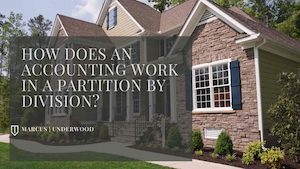 When two parties jointly own property but cannot agree on its use, then the sale of the property by a “partition” action is frequently a great remedy to solve the dispute. This tool, however, is not available in all circumstances. While a “partition by sale” makes a lot of sense with regard to a single-family home, it may not make as much sense when the land at issue is vacant undeveloped land. In that instance, a partition by division—the simple division of the property—may be the best outcome for all the parties. A partition by division, however, raises the question of how to account for unequal contributions to the property.
When two parties jointly own property but cannot agree on its use, then the sale of the property by a “partition” action is frequently a great remedy to solve the dispute. This tool, however, is not available in all circumstances. While a “partition by sale” makes a lot of sense with regard to a single-family home, it may not make as much sense when the land at issue is vacant undeveloped land. In that instance, a partition by division—the simple division of the property—may be the best outcome for all the parties. A partition by division, however, raises the question of how to account for unequal contributions to the property.
Amounts Paid For Partition Action
Code of Civil Procedure section 873.250 provides that where a division of property cannot be made equally among the parties according to their interests, without prejudice to any party, then compensation may be required to be made by one party to another to correct the inequality. This is commonly called “owelty.”
What is Owelty?
“Owelty” is a sum of money paid by one former tenant to another after partition resulting in the unequal division of property to equality disproportionate division. (Gonzalez v. Gonzalez (1917) 174 Cal. 588.) Owelty is decreed by a court as a part of a judgment of partition to compensate a prejudiced party. The term is almost always applied to a partition of lands.
The Difference Between Owelty and Accounting?
The availability for “owelty” in a partition action, however, is different from compensatory adjustments made under the ordinary principles of equity for an accounting. (CCP § 873.250.) Because of the equitable nature of a partition action, such an action normally includes an accounting so that the parties’ respective rights can be adjusted and settled. (CCP § 872.140; see In re Flynn (B.A.P. 9th Cir. 2003) 297 B.R. 599.) This is because the court can apportion the costs of a partition as may be equitable under the circumstances. (CCP § 874.040.)
Collecting For My Contribution To The Property?
There are at least two ways that an owner can collect from their co-owner in a partition action. First, when the physical division does not exactly equal the allotted value of the parties’ various interests, then a referee or court can order that compensation be paid from one to the other. (CCP § 873.250.) Second, a co-tenant who has paid a debt or obligation for the benefit of the common property has a right to recover a proportionate share of the amount paid from the other co-tenant who has received the benefit of the payment, and the partition decree may provide that the latter’s obligation will be discharged as a lien. (Rich v. Smith (1915) 26 Cal.App. 775; Ventre v. Tiscornia (1913) 23 Cal.App.4 598.)
What should I do if I need to partition vacant property?
If you are faced with a property to which a partition by sale is not a good fit, then you may consider seeking a partition by division. Because the rules about a partition by division can be complicated, you may benefit from good legal advice on the topic.
If you find yourself contemplating a partition action, or faced with defending one, then please contact Underwood Law Firm, P.C. for an initial consultation.










